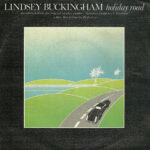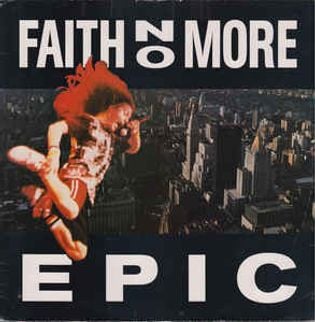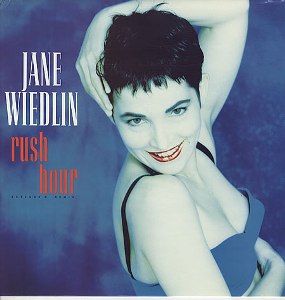 “Holiday Road” by Lindsey Buckingham is one of those songs that has quietly embedded itself into the cultural DNA of American pop music. Released in 1983 as part of the soundtrack for National Lampoon’s Vacation, the track captures a sense of unbridled freedom, youthful adventure, and the peculiar magic of road trips that many listeners have never experienced firsthand but immediately recognize. It’s a song that, at first listen, might come across as a breezy, fun novelty tune tied to a particular movie, but its musical craft, infectious energy, and enduring appeal reveal a deeper resonance that has allowed it to remain relevant for decades. Lindsey Buckingham, already well-known for his work with Fleetwood Mac, brings a singular approach to songwriting and performance here, blending catchy melodic hooks, inventive guitar work, and an overall vibe that feels both whimsical and meticulously composed. The song operates on multiple levels: it is a soundtrack to laughter, a celebration of adventure, and, in many ways, a small testament to the art of pop-rock songwriting at its most concise and effective.
“Holiday Road” by Lindsey Buckingham is one of those songs that has quietly embedded itself into the cultural DNA of American pop music. Released in 1983 as part of the soundtrack for National Lampoon’s Vacation, the track captures a sense of unbridled freedom, youthful adventure, and the peculiar magic of road trips that many listeners have never experienced firsthand but immediately recognize. It’s a song that, at first listen, might come across as a breezy, fun novelty tune tied to a particular movie, but its musical craft, infectious energy, and enduring appeal reveal a deeper resonance that has allowed it to remain relevant for decades. Lindsey Buckingham, already well-known for his work with Fleetwood Mac, brings a singular approach to songwriting and performance here, blending catchy melodic hooks, inventive guitar work, and an overall vibe that feels both whimsical and meticulously composed. The song operates on multiple levels: it is a soundtrack to laughter, a celebration of adventure, and, in many ways, a small testament to the art of pop-rock songwriting at its most concise and effective.
The song opens with a deceptively simple, chiming guitar riff, immediately conjuring images of asphalt stretching toward a distant horizon, sun bouncing off the windshield, and a sense of possibility that comes with hitting the open road. This riff is both playful and precise, a hallmark of Buckingham’s guitar work throughout his career. His signature style—fingerpicked, nuanced, and rhythmically dynamic—imbues the track with a texture that is surprisingly rich for what might otherwise be dismissed as a light pop-rock tune. The riff is more than a hook; it sets the tone for the song’s entire narrative, establishing an aural motif that mirrors the cyclical motion of driving, turning, and returning. Listeners can almost feel the rhythm of the car’s tires on pavement in Buckingham’s meticulous articulation of notes, a subtle interplay between melody and movement that makes the song feel kinetic even in a quiet room.
Vocally, Buckingham delivers “Holiday Road” with a kind of irrepressible charm that balances casual storytelling with precise phrasing. His voice, crisp and slightly nasal in that unmistakable Buckingham style, rides the melody effortlessly, conveying both humor and a sly sense of commentary on the joys and absurdities of travel. The lyrics, though straightforward—depicting various quirky road trip experiences—benefit from Buckingham’s nuanced delivery, which turns simple observations into vivid, memorable moments. The opening lines establish the song’s tone perfectly: lighthearted, slightly mischievous, and brimming with kinetic energy. Each verse unfolds like a vignette, a mini story encapsulating the unpredictability and delight of a journey where anything can happen, from roadside attractions to encounters with the bizarre. There’s a universality in this that makes “Holiday Road” relatable across generations: who hasn’t experienced the mixture of excitement and mild chaos that comes with a long drive, whether it’s to the mountains, the beach, or some destination far off the map?
Musically, the track is deceptively sophisticated. Buckingham layers multiple guitar tracks, creating a shimmering, multi-dimensional sound that is both lush and airy. The production, while not overly ornate, is crisp and precise, allowing each instrument to occupy its own sonic space while contributing to a cohesive, driving soundscape. The bass line and percussion are tight and propulsive, providing forward momentum that mimics the sensation of motion on a long highway. Yet there is a sense of playfulness in the arrangement as well, evident in the sudden bursts of rhythm, slight changes in guitar timbre, and the interjections of background vocals. These elements transform what could have been a mere novelty track into a piece of music that rewards repeated listening, revealing subtleties in instrumentation and arrangement that might be missed on a first pass but emerge on deeper engagement.
One of the most remarkable aspects of “Holiday Road” is its ability to capture a narrative without sacrificing musical complexity. The song functions almost like a cinematic score condensed into a pop-rock format. Each verse presents a different snapshot, and Buckingham’s guitar work, combined with his layered vocals, guides the listener seamlessly from one scene to another. The chorus, which is instantly memorable, offers a sense of release and collective recognition; it’s the musical equivalent of pulling into a scenic overlook and taking a breath to appreciate the journey thus far. There’s an economy in Buckingham’s writing here—no extraneous flourishes, no wasted notes—yet the song never feels sparse or underdeveloped. Every element, from guitar lines to drum fills to vocal inflection, is purposeful, contributing to a sense of forward motion, optimism, and just a touch of irreverent fun.
The track’s connection to National Lampoon’s Vacation is an essential part of its identity, yet it has managed to transcend the film to become a cultural touchstone in its own right. While many movie songs fade into obscurity once their respective films recede from public memory, “Holiday Road” has endured because it embodies a broader idea—the quintessential road trip, with all its unpredictability, humor, and sense of possibility. Its inclusion in the film perfectly complements the narrative, highlighting Clark Griswold’s obsessive pursuit of family adventure and the humorous pitfalls that accompany it. Yet even when removed from that cinematic context, the song continues to resonate because it encapsulates the universal experience of movement, travel, and the quirky unpredictability of life on the road.
Buckingham’s guitar solo, brief yet unmistakably precise, further exemplifies the song’s layered brilliance. Unlike the extended solos typical of rock in the early 1980s, this solo is concise, melodic, and perfectly tailored to the song’s narrative arc. It punctuates the storyline, acting as a musical exclamation point that reinforces the sense of joy, spontaneity, and lighthearted tension that permeates the track. It’s a demonstration of Buckingham’s mastery: a solo that does not dominate the song but instead integrates seamlessly into its fabric, enhancing the listener’s experience without disrupting the flow. It is an elegant example of musical restraint married to technical skill, an approach that underscores Buckingham’s reputation as a meticulous and inventive musician.
The production choices throughout “Holiday Road” reflect Buckingham’s attention to detail and his understanding of the song as both a musical and narrative vehicle. Each instrument is carefully positioned in the mix, creating a sense of spatial awareness that mirrors the physicality of a road trip. The layering of guitars, vocals, and rhythm sections allows the song to breathe while maintaining momentum. The sonic clarity enables the listener to pick out individual elements—nuances in guitar articulation, subtle percussion accents, and background vocal harmonies—while still appreciating the overall cohesion of the piece. There’s a transparency in the mix that aligns with the track’s thematic openness: a song about exploration, discovery, and the simple pleasures of movement.
Culturally, “Holiday Road” has enjoyed remarkable longevity, partially due to its adaptability and inherent charm. It has been used in various media contexts beyond its original cinematic home, from television commercials to nostalgic pop culture references, each time reinforcing its association with adventure, humor, and the exuberance of youth. The song’s catchiness ensures that it sticks in the listener’s mind, while its layered musicality rewards attentive engagement. It is both accessible and nuanced, a rare balance that explains why it continues to resonate decades after its initial release. For those familiar with Buckingham’s work in Fleetwood Mac, “Holiday Road” also provides insight into his unique compositional voice—playful, inventive, and deeply attuned to melody and texture.
Lyrically, the song is deceptively simple but effective. Each line contributes to the overall tapestry of a road trip narrative without overwhelming the listener with unnecessary detail. The lyrics’ charm lies in their universality: they describe mundane yet humorous situations that almost anyone can relate to, from getting lost to encountering eccentric strangers. Buckingham’s delivery injects the lyrics with life, ensuring that humor, excitement, and slight absurdity are conveyed in equal measure. The combination of musical momentum, catchy melody, and clever lyrical phrasing ensures that the song maintains energy from start to finish, evoking the thrill of movement and discovery.
It is also worth noting the timing of “Holiday Road” in the broader context of Buckingham’s career. By the early 1980s, he had already established himself as a formidable songwriter and guitarist within Fleetwood Mac, known for intricate guitar lines, complex harmonies, and emotionally rich songwriting. “Holiday Road,” while lighter and more playful than much of his work with the band, demonstrates his ability to distill these skills into a concise, pop-oriented format. The song is a testament to Buckingham’s versatility, showing that he could craft music that was simultaneously commercially appealing, narratively effective, and musically sophisticated. It’s a reminder that even a seemingly straightforward novelty track can be a showcase for skill, taste, and subtle artistry when in the hands of a master.
Another reason the track endures is its sheer optimism. In an era often dominated by darker, more introspective rock and pop music, “Holiday Road” radiates a kind of irrepressible joy that is both rare and refreshing. The song celebrates motion, spontaneity, and the inherent humor of life’s unexpected twists and turns. Its infectious energy is not manufactured or gimmicky but instead emerges organically from the interplay of melody, rhythm, and performance. There’s a genuine sense of fun in Buckingham’s playing and singing that transcends the specifics of the lyrics or the film, allowing listeners to connect with the track on a purely emotional level.
Over the decades, “Holiday Road” has become more than just a soundtrack piece; it has evolved into a symbol of a particular kind of American experience, the open road as a metaphor for freedom, adventure, and self-discovery. Its popularity endures because it captures the thrill of exploration, the minor absurdities of travel, and the musical sophistication of an artist at the top of his game. Whether heard as part of National Lampoon’s Vacation or as a standalone track, it evokes a sense of timeless escapism and playful reflection. The song’s longevity is a testament to Buckingham’s talent, the quality of the songwriting, and the universal appeal of its themes.
In conclusion, “Holiday Road” by Lindsey Buckingham is more than just a movie tie-in or a catchy pop-rock track. It is a compact masterpiece of musicality, narrative storytelling, and emotional resonance. The song balances simplicity and sophistication, humor and artistry, accessibility and nuance in a way that few tracks manage to achieve. From its memorable guitar riff and propulsive rhythm to its playful, narrative lyrics and expert production, “Holiday Road” continues to captivate listeners and inspire road trips, laughter, and nostalgia. It is a reminder of the power of music to elevate ordinary experiences into something remarkable, to transform a simple drive into an adventure, and to encapsulate the joy and unpredictability of life itself. Lindsey Buckingham’s work on this track stands as a testament to his skill, creativity, and unique voice in popular music, ensuring that “Holiday Road” remains a beloved and enduring piece of the American musical landscape.


